Today we’re going to talk about a game that could probably fill an entire blog on its own: Disco Elysium. Submitted as a suggestion by one of my viewers, I knew next to nothing about it before we started. I went in expecting to experience an interesting story from an isometric perspective. You can read here whether my expectations were met.
First of all, the most important thing: this article only deals with the most important things that struck me about this game and moved me. The game and the room for interpretation about practically every blade of grass is huge. The main story itself is explained quite quickly and not too long; however, the story surrounding it, the characters you meet and the different parties involved are all worked out in great detail. Add in the side quests and you could put hundreds of hours into this game. Another indicator of this is the trailer: I just watched it before writing this article and didn’t recognize a scene as I had seen it in my run.
But what is it actually about? The game starts with waking up – without clothes, in a completely destroyed hotel room. After we’ve pulled ourselves together, we find out two things relatively quickly: we trashed the hotel room and we’re actually a cop who’s supposed to solve a murder case. And since we’ve apparently been noticed rather negatively so far, we’ve been given a partner: Kim Kitsuragi.
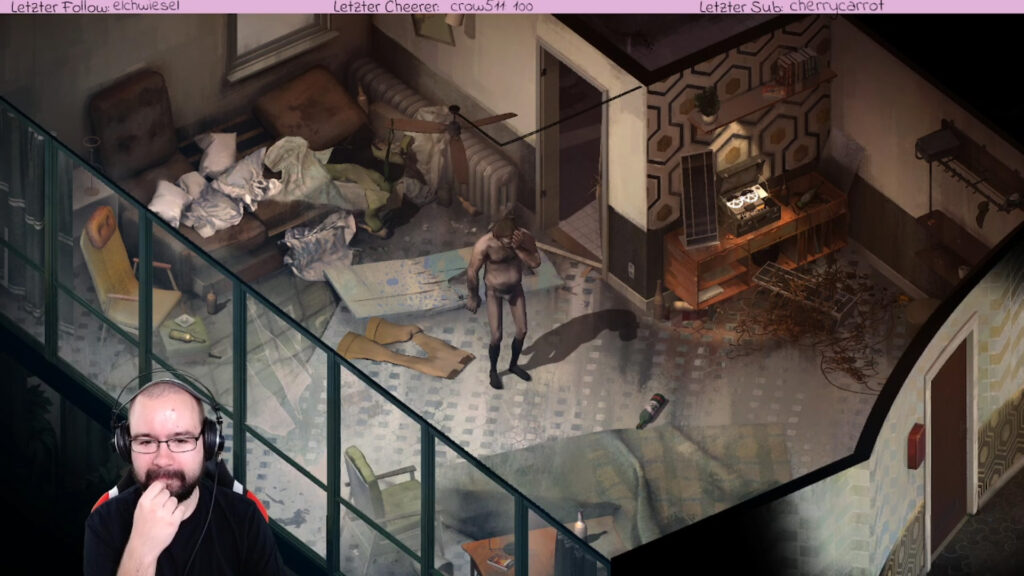
The main story of the game revolves around solving the murder case. However, personal issues, including heavy alcoholism and the loss of our badge and gun, make it quite difficult. The murder appears to have been politically motivated from the start and has further fueled the mood in an already very unstable society. The population doesn’t trust us or doesn’t want to talk to us. Everyone has their own goals, and very few want to know the real reason for the murder if you can’t exploit it – perfect conditions.
So let’s start the investigation. I don’t want to go into the story itself – just like I didn’t do in the first stream. Because the game masters one thing perfectly: it sucks you into the virtual world. Not just into the story itself, but really into the world. With every bit you learn about the past, the political circumstances and the world views of the people, you want to know more. I’ve barely watched a game that made this so incredibly good.
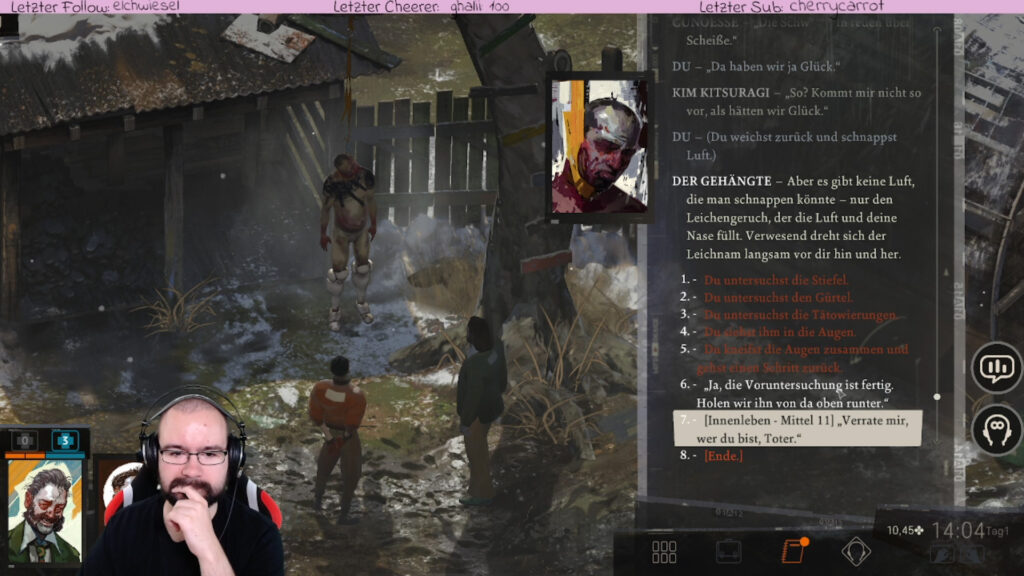
For me, this was reflected in the side missions, among other things. There are a few that you have to do – but there are a great many that you get drawn into. I’ve explored the world many times, found a door, and I’ve been into a new story arc. But everything was so well and tightly interwoven with the main story and the world around it that I often didn’t even notice it until another item appeared on my to-do list or was ticked off. And it didn’t feel like a completed task either, but more like a natural fork, as it could happen in real life.
It also made me realize another thing: how huge this game is. Not as square footage on the map, but with the story. You stumble from one rabbithole to the next, but you also like to be carried away by the grandiose story. This is how you spend hours in the same house just to find all the secrets.
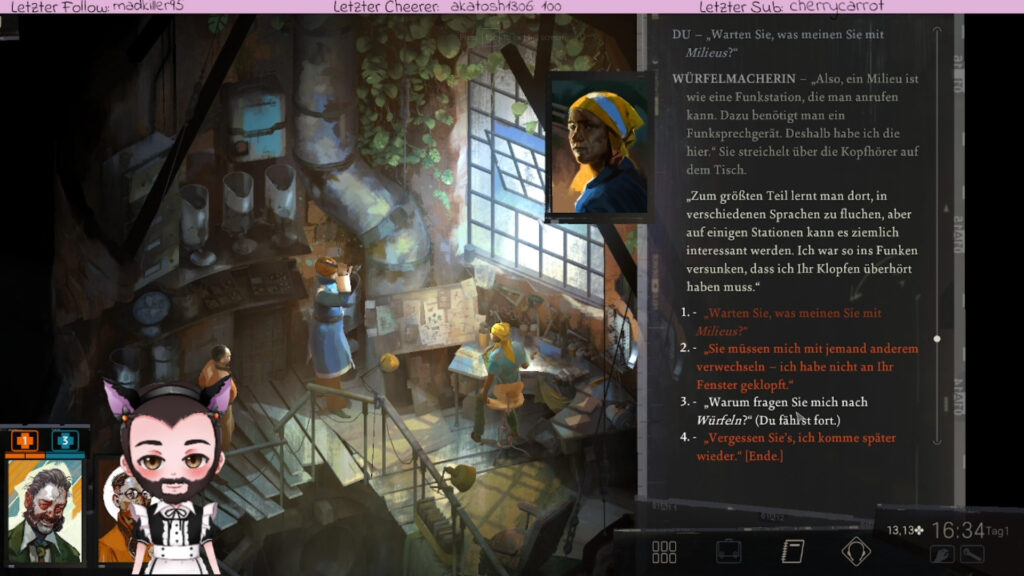
It’s hard for me to describe it in more detail. You were always interested in solving the case and running around like a cop looking for clues – and that’s what made it feel so natural. Sometimes you’ve followed a trail and found answers; sometimes it was something completely different, but still rewarded you with more knowledge of the world.
The whole experience became particularly immersive through the dialogues. I don’t think the ones with the NPCs are particularly worth mentioning – they were well done, the characters all had very convincing personalities and values, which they acted on consistently (or not so consistently, depending on their character). Nevertheless, the inner dialogues convinced me much more.
In addition to normal conversations, the subconscious spoke up again and again. This was divided into different personality traits, which – also depending on the skill level – sometimes contributed more, sometimes less useful things to the situation. Most of the time it was about the case, but sometimes it was about completely different things – how do we feel right now, what do we think about certain population groups or religions, what political views do we actually have? Everything with selectable answers and fully voiced – I think it was great!
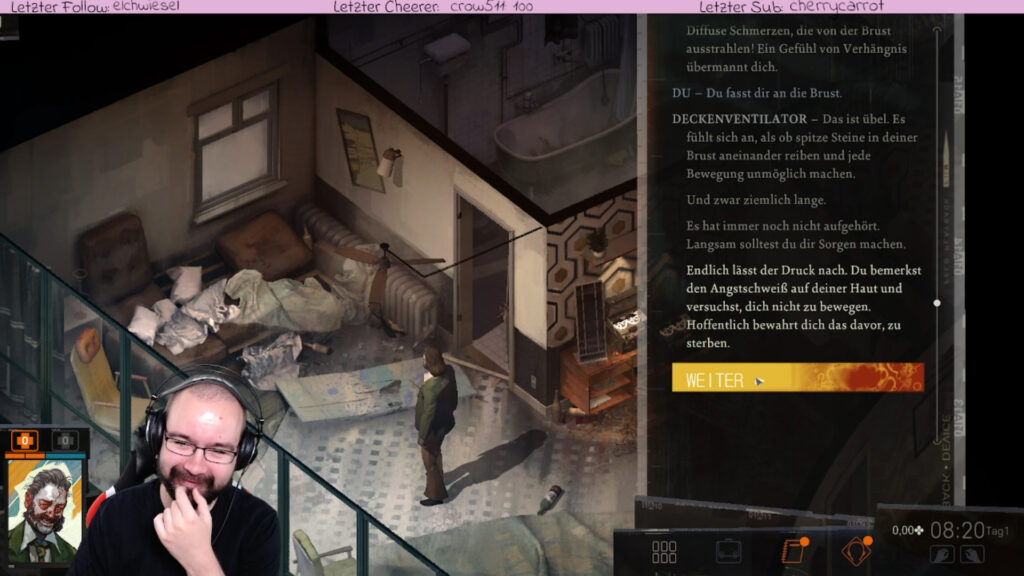
There is so much more I could mention at this point. The skill tree, which I’ve only scratched the surface of even while playing, as well as the ability to internalize certain ideas or ideologies (the latter led to us becoming a communist fascist by the end of the game – don’t ask). The various elements that were weird, interesting, or just plain funny. But all of this is going too far now – play it yourself. Even if you’ve already seen my walkthrough, yours might be very different.
For the sake of completeness, let’s get to the technical part: as already mentioned, the game comes in an isometric view. The graphic style looks very unique – a bit surreal, almost like an oil painting. You control everything with the mouse, with a few key combinations as shortcuts. You interact with the objects around you, talk to people, it’s mechanically a classic role-playing game.
Almost every action you can take has an impact later. Either directly visible through changes in the game world, or indirectly because we reveal certain character traits about ourselves. The latter causes people to perceive us differently. If they agree with us, they help us. If we said something wrong, we may block a path.
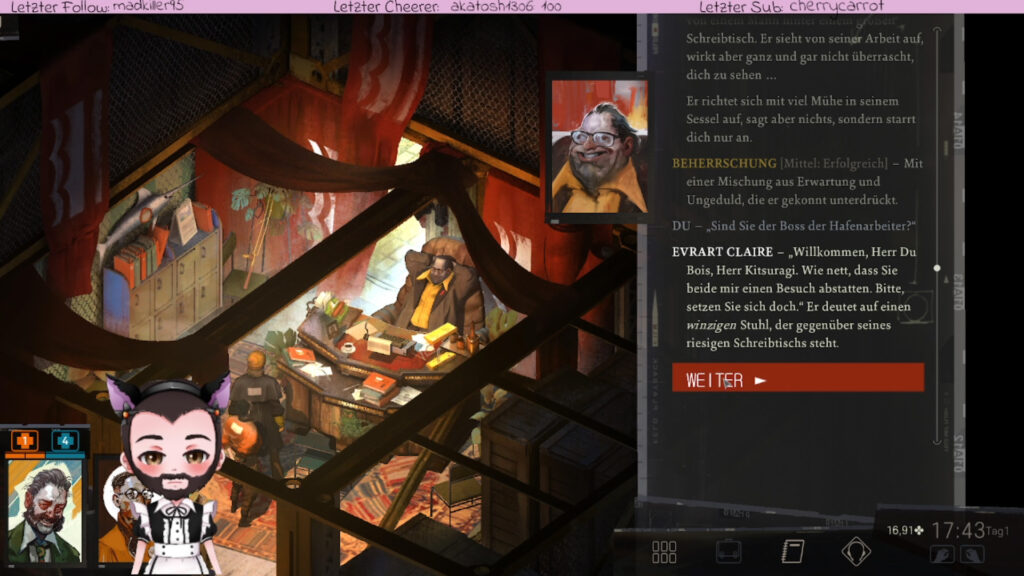
A special feature here is the dice system. For example, if we try to convince someone of something, this can be a one-time chance – it is decided by a dice roll. Depending on how high our acting skills are, the probabilities are changed in our favor. The same goes for other skills – if you’re a good mechanic, you’re more likely to pick the lock than otherwise. These abilities can be enhanced with items of clothing or tools – just a role-playing game.
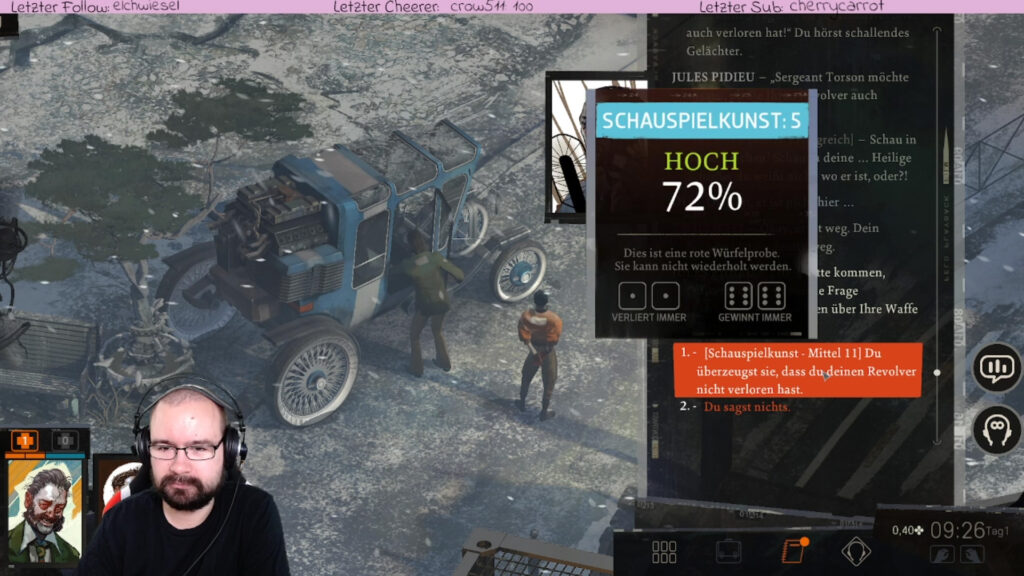
With all the excitement I feel for this game, there were two things that I didn’t find very good. One directly affects the dice situations. These were sometimes unrepeatable, but the result was important to the story – I often didn’t know what else to do. However, since the chance of a good result was low, the following scheme quickly fell into place: save quickly – roll the dice – if it didn’t work, load and try again until it works. That was definitely not what the inventor intended, but it was the only way to get ahead from time to time.
The second was the openness of the game world. That sounds strange at first, but there is always a problem with openness: the lack of orientation. There were situations where I absolutely didn’t know what to do now. Since there are also time-dependent missions that, for example, could only continue on the following in-game day, but on the other hand there was no good way to let time pass, I kept running around aimlessly. I often found a good occupation with one of the many side missions – but in my opinion it wasn’t optimal.
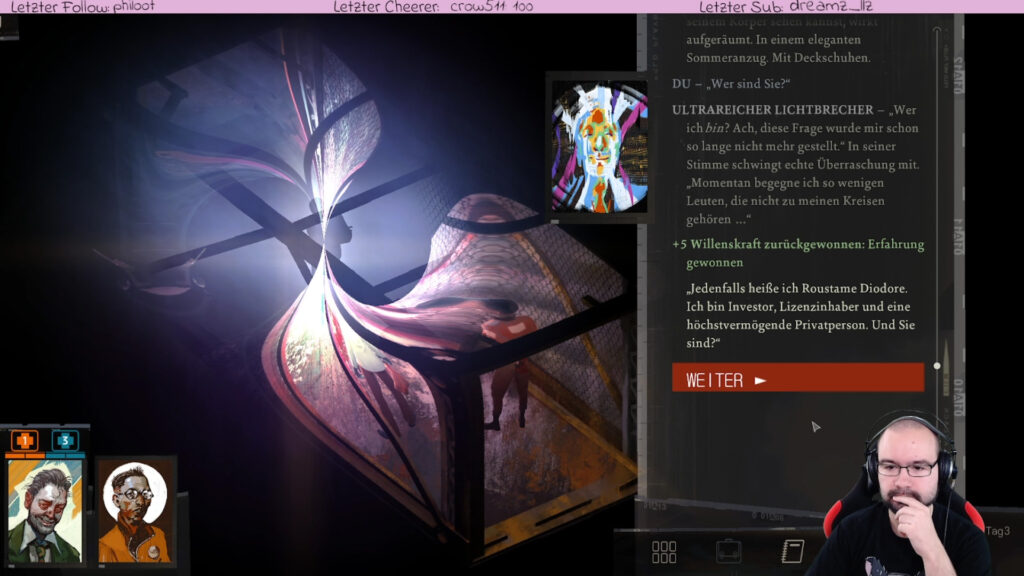
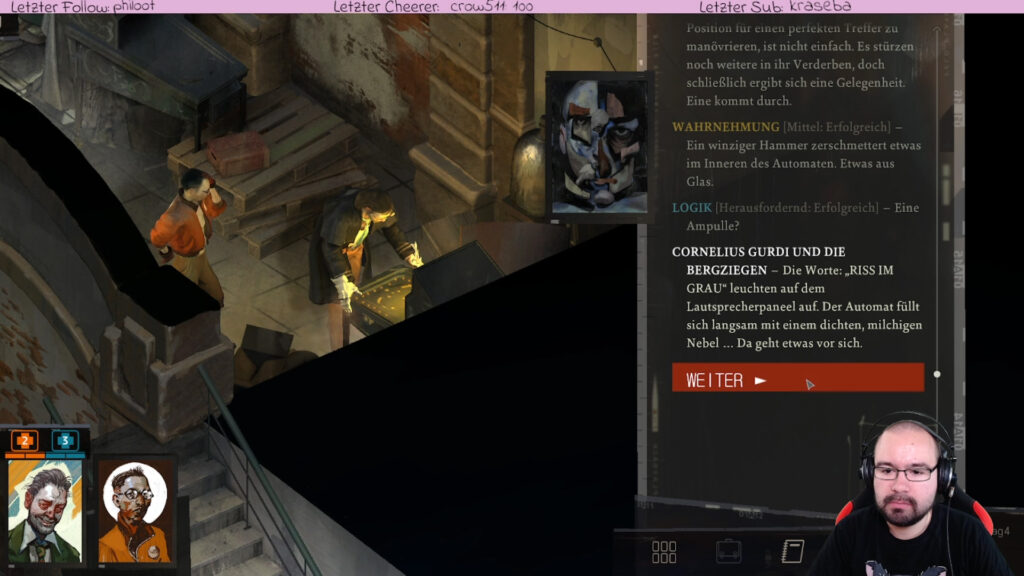
Finally, what do I think of this game? Maybe it came through subtly: I love it. It’s one of the best games I’ve played this year and I’m very grateful for the recommendation – honestly, I would have missed it entirely otherwise. I recommend it to anyone who likes a detailed story and can handle the sometimes very dark humor and a pure dystopia.
What do you think about this game? did you like it Did you play it yourself? Feel free to discuss it with me on Discord!